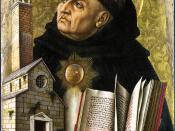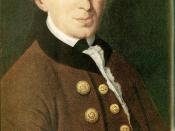A teleological argument is an argument for the existence of a supernatural designer of the universe based on an empirical observation of order, purpose and design in nature. It is argued that nature is too complex, orderly and adaptive to have occurred randomly or accidentally. Therefore, there must be an intelligent designer behind the whole process. This intelligent designer in most versions of the teleological argument is a direct inference to God. Due to the fact that the teleological argument is presented in many forms, I will set its boundaries in this paper by focusing on William Paley's analogy of the watchmaker and Thomas Aquinas' fifth way for the argument of the existence of God. In order to weigh the soundness of the argument in question, I will outline some of its criticisms, looking particularly at the views of Immanuel Kant, David Hume and Darwin's theory of natural selection.
Finally, I will conclude with my own assessment of the teleological argument.
2. Presenting the argumentA teleological argument involves the claim that the universe is designed for something. To be more accurate, a teleological argument is a claim that the universe 'has been programmed to evolve towards some final goal' (Davies 1983:165). For example, predators such as dogs and wolfs have ears facing forward so as to detect more easily the sounds from their prey. The resultant argument from such observations, in its various logical forms, concludes that the universe is a planned, purposive and intentional design of some intelligent mind. As already been said above, the intelligent mind, in most versions of the teleological argument is thought to be God. Before we consider Paley's analogy of the watchmaker, let us look at Thomas Aquinas' presentation of this argument.
2.1 Thomas AquinasIn the Summa Theologia, Aquinas...


